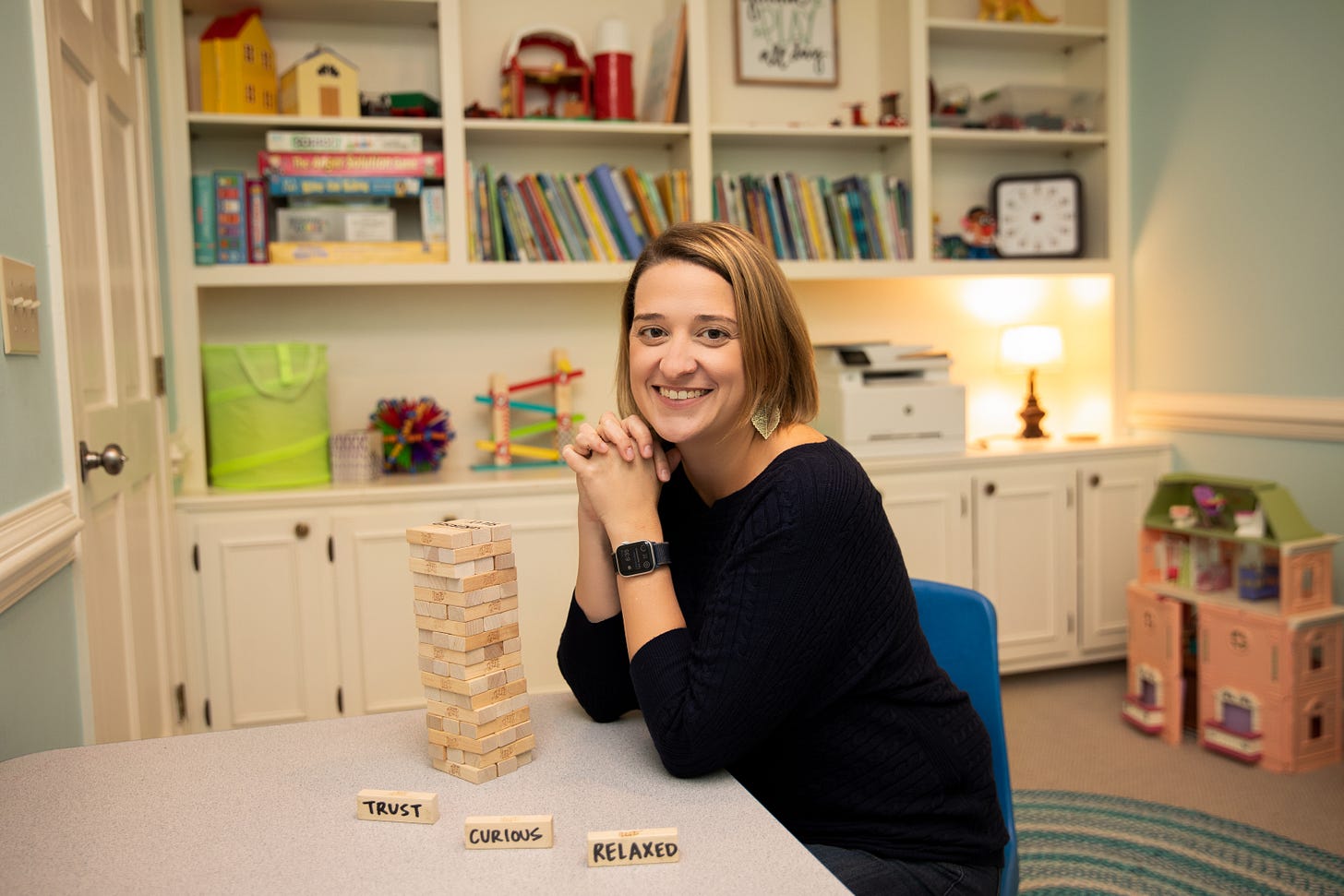
As a mental health professional, I work under the assumption that everyone is always doing the best they can with the resources they have at any given time. These resources might include what’s available based on our finances, energy level, mental wellness, emotional regulation, or prior knowledge of any given situation.
As Maya Angelou said, “Do the best you can until you know better. Then, when you know better, do better.” And, as Ross Greene said, “Kids do well if they can.” I believe adults do well if they can, too. But, our lack of experience with certain situations and emotional dysregulation when overwhelmed often get in our way, just like it does for our kids. I see this happen the most when parents and teachers come together in meetings to solve complex problems on behalf of students.
All parents and educators want what is best for the child. But when it comes to supporting a child with a complex constellation of strengths and needs within a group of children who also have their own constellation of strengths and needs, it gets complicated.
I have attended hundreds of Individualized Education Plan (IEP) meetings in a variety of roles as a school psychologist employed by a public school system, a child psychologist in private practice, and as a parent. Each of these roles has shifted my lens of how teachers and parents work together most effectively.
I often say that being a parent has taught me more about child psychology than I learned in graduate school with one exception: School Consultation. In my School Psychology graduate program, I completed multiple courses on how to effectively consult with teachers about student needs in the classroom. The first lesson I learned about school consultation was to understand that as a School Psychologist that is not my classroom—it is the teacher’s classroom.
The first thing I tell teachers is this: I’m going to share my ideas but they may or may not work depending on many variables you are having to manage in your classroom, and I get that. Most teachers are relieved to hear that they have permission to tell me if they think something I’ve suggested just isn’t going to fly in their setting. I have learned to stay open, curious, and collaborative in order to solve problems. Every person’s perspective is valid and that is our starting point.
When I am in IEP meetings as a parent, I still experience my Mama Bear emotions on the inside, but I operate as a professional on the outside. Finding this balance has always led me to better outcomes when collaborating with school staff and I know these meetings have led to better outcomes for my child.
I’ve seen strong emotions either derail or stall meetings so today I want to help you avoid the five roadblocks I’ve noticed get in the way of parents and teachers effectively collaborating, as well as my ideas for solutions.
Making Assumptions
Sometimes we assume that if our child is doing well at home, then everything should be just fine at school, too. However, the demands of school can be vastly different from home and each school year brings new challenges. Also, if a child has never done something at home that has been observed at school, it can be hard to believe it when someone tells us otherwise. Trusting each other’s perspective here is paramount. It’s absolutely possible for children to perform certain skills at home that are different from school and vice versa. Factors like time of day, structure, predictability, relationships, and interests in the activity all vary between home and school.
Solution: The best thing we can do when we are met with a discrepancy between home and school is to figure out why it’s working in one of these settings so that we can duplicate this success elsewhere.
Withholding Information
When I worked as a School Psychologist and a student had been evaluated by a child psychologist in private practice, sometimes the family would only share certain pages of the report with the school team. I understand that some parents feel very private about details in their child’s psychological evaluation, but having less information limits educators’ ability to understand, connect, and support your child.
Parents may also withhold information about stressful living situations at home, assuming it’s irrelevant to their child’s school day. But, our nervous systems carry around stress from place to place and children are no different. When a child is struggling and their teacher can’t figure out why, often their next thought is to wonder what could be happening at home. This isn’t to point fingers, but to make sense of things. If everything is stable at home, then we need to get curious about something that might be causing stress during the school day or inside the child’s body that we don’t know about yet.
Solution: I always recommend sharing all the information with all the people who will come into contact with your child. If not, the adults interacting with your child will be operating from a disadvantage. If you do not trust someone on your child’s team, talk to the school administrator about your concerns so they can help build trust rather than continuing to work with limited information.
Leading with Emotions
Parent-teacher conferences, 504 meetings, and IEP meetings are all emotional events. Everyone involved is working hard to help children. Parents are often exhausted from their own job, parenting, and now trying to figure out why school is so hard for their child. Teachers are exhausted from the demands of a classroom full of neurodiverse learning needs and sometimes not enough resources to meet those needs. When everyone is working hard, feeling tired, and doing their best, it’s easy to feel sensitive if someone asks you to explain why things aren’t going well.
Sometimes, parents feel they will get what they want by demanding it from school staff. However, this tends to break down collaboration. Think about how you feel when someone demands something from you when you have already tried everything you can think of? Emotional demands from others alert our nervous system to go on defense; we feel tense, we sometimes freeze, and creativity tanks.
Solution: Interact with school staff as you would in the workplace. Be honest about your emotions if you feel safe to do so, just remember it’s hard for others to grow if they feel emotionally attacked. Write out what you want to say before you get there so you can read it to the team if your mind goes blank in the moment. If you are concerned that your child’s teachers need more training to understand your child’s needs, speak to an administrator about it. We are all learning and growing but we have to remain safely connected within relationships to get there.
Ignoring Boundaries
At times, we as parents feel safer when we know all the things. But, teachers do not have time to communicate all the things. As much as you can, follow the boundaries of communication your child’s teacher has set forth. There will be exceptions if your child is struggling more often, but generally speaking, minding boundaries builds trust.
Solution: If you find yourself wanting to text your child’s teacher at 9:00pm, keep your questions in your notes app to share in the morning or draft emails and read them again with fresh eyes in the morning before sending them, especially if you’re feeling angry or stressed.
Thinking Teachers Can Solve All the Problems
It’s easy to assume that because schools have speech/language pathologists, occupational therapists, social workers, counselors, and psychologists that they should be able to help our child develop all their skills within the school day. In reality, all special education decisions are related to helping our children learn and socialize within the school building. It’s very possible that a child’s IEP is designed to help them succeed at school but does not provide enough support to help them make developmental progress at home and in the community. Our children’s school success is just one part of their growth.
Solution: Share all the things you are doing for your child outside of school with the school team. Communicate additional support you are providing and share stories of progress you see outside of school. If something is successful at home or in the community, maybe school staff can figure out how that success can be replicated to support something challenging your child in the classroom.
I know these meetings are hard and often long. And, I know you sometimes want more than the school can offer your child. But when you continue showing up in collaboration with your child’s team, your child will be the one who wins.
Let’s Stay Connected!
~Dr. Emily
P.S. How has parent-teacher collaboration gone right or wrong for you. Tell us in the comments!
I’m Dr. Emily, child psychologist and former school psychologist, and I’m on a mission to help parents and teachers be the best adults we can be for the neurodivergent kids and teens in our lives. This isn’t about changing the kids, it’s about changing us. Learn more with my resources for parents, teachers, and schools at www.learnwithdremily.com.
**All content provided is protected under applicable copyright, patent, trademark, and other proprietary rights. All content is provided for informational and education purposes only. No content is intended to be a substitute for professional medical or psychological diagnosis, advice or treatment. Information provided does not create an agreement for service between Dr. Emily W. King and the recipient. Consult your physician regarding the applicability of any opinions or recommendations with respect to you or your child's symptoms or medical condition. Children or adults who show signs of dangerous behavior toward themselves and/or others, should be placed immediately under the care of a qualified professional.**




This is excellent advice! I especially appreciated the part about respecting boundaries. As a school administrator I would frequently have to contact families about discipline issues. I quickly noticed a pattern - parents would often become very upset when I would tell them about the consequence that their child was facing but was unable to tell them about what consequence any others involved might have. As a parent myself, I completely get it - you want to make sure that your child is being treated fairly. But I could not legally share that information. Understanding and respecting that there are boundaries that we just cannot cross in a school builds much respect from school staff towards a parent.
Being a parent also shifted my lens on IEP meetings. Two of my four children had IEPs and one has a 504. I remember sitting in one of those first IEP meetings feeling completely overwhelmed. Afterwards I thought about the fact that I have two degrees in education as well as years of experience in multiple roles in a school district. If it was overwhelming for me given my background, I cannot imagine how overwhelming it must feel to someone without that background. It had an impact on how I participated in those meetings as an educator - specifically making sure that parents had a clear understanding of everything that was being discussed.